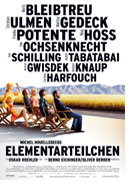

Opening 23 Feb 2006
Directed by:
Oskar Roehler
Writing credits:
Michel Houellebecq, Oskar Roehler
Principal actors:
Hermann Beyer, Moritz Bleibtreu, Simon Boer, Tigan Ceesay, Martina Gedeck
Flashbacks reveal the childhoods of two half brothers who live separately with different grandmothers. They are fully unaware of each other until, at about age 15, their flighty mother introduces them. As adults, Michael (Christian Ulmen) is an introverted, highly intelligent researcher in the science of cloning, which, he thinks, is a practical substitute for sex. Bruno (Moritz Bleibtreu) is made of studier stuff on the outside, but is vulnerable on the inside and compensates for his love/hate relationship with his mother by seducing many inappropriate women in spite of being married and a father. He suffers breakdowns and lands in hospital wards, and Michael is his only dependable visitor. We suffer with them as they struggle. They bury their dead mother; Bruno visits his alcoholic, penniless father (Uwe Ochsenknecht who mumbles incoherently); Michael returns to England to finish a research project; Bruno checks into a kind of nudist, free-love colony. Both finally settle down with the right women: Michael with rediscovered childhood friend Annabelle (Franke Potente) and Bruno with Christiane (Martina Gedeck), a dominatrix who takes him to group sex parties. Things are looking up, but not before there is a hospital death scene worthy of Love Story or Million Dollar Baby.
German director Oskar Roehler’s grandparents supposedly also raised him, which is perhaps one reason he was drawn to film the best-selling book by Frenchman Michel Houellebecq. Roehler has a history of filming family interaction: for example, Agnes and His Brothers (in this case, three unlike brothers), Der Alte Affe Angst, and Die Unberührbare. This film offers a good chance to see top German actors at their best, especially notable: Ulmen, Gedeck, and Tom Schilling as young Michael, not to forget Bleibtreu who won the best actor award for this role at the 2006 Berlinale. The colors and the photography are beautiful. But, once again, mom is to blame that the boys are a mess. And why does this most European of films have a soundtrack with a collection of English pop songs (although it was fun to hear American Pie again)? Michael says, “The truth is like an elementary particle, split to its lowest denominator.” Perhaps you can find symbolic meaning in the title (which translates as The Elementary Particles); otherwise, just enjoy the film as an overly long, well-made German movie. (Becky Tan)